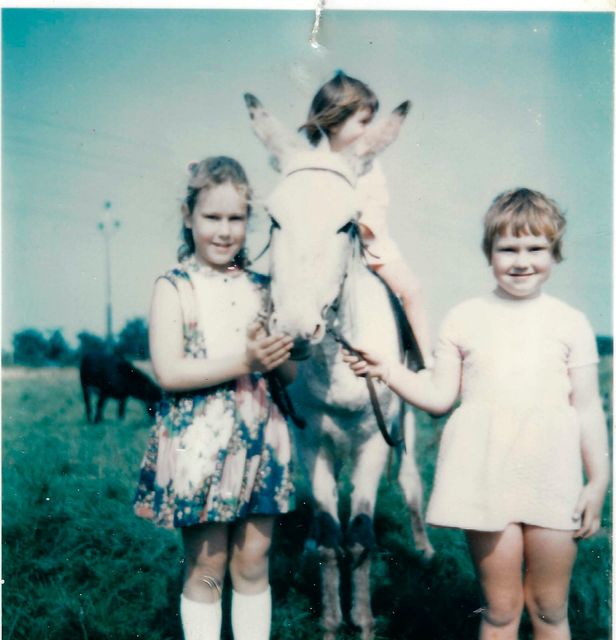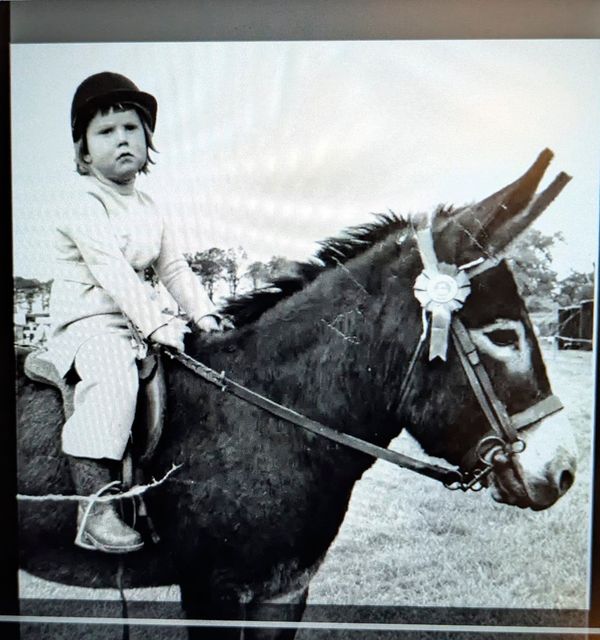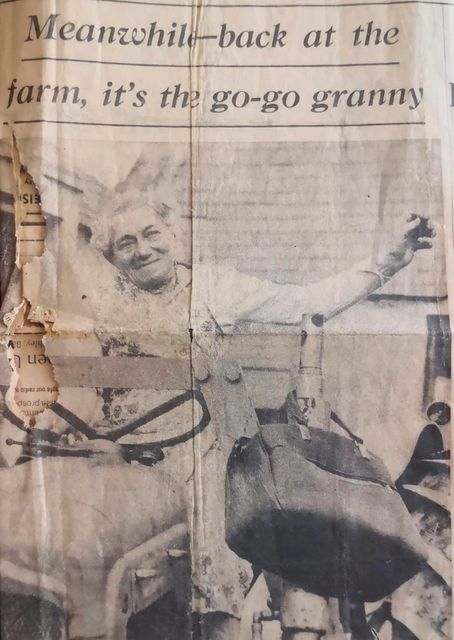A Northern Ireland man who runs a facility which uses donkeys as therapy animals has described the “wonderful” experience of appearing on BBC’s The Repair Shop.
Robert Wallace and his mother Amanda featured on the Christmas special of the popular series, which sees contestants bring along much-loved family items to be repaired.
The pair came with a saddle once owned by his great-grandmother hoping that it could be restored, having come from a long line of donkey farmers in Northern Ireland.
Speaking to the Belfast Telegraph, Robert said he was approached directly to be on the series and didn’t apply, and took part in filming just last month for a quick turnaround as the episode aired on Christmas Eve.
Robert’s mother Amanda (left) and her sisters Lesley and Joanne, alongside Lucy the donkey
“The production reached out and asked if we would have anything that was sentimental on the donkey farm and we had a couple of things — but the one thing that really stood out was my great-grandmother’s straddle pad, which was in need of repair,” he said.
“The producers then approved it and we went over mid-November and I flew over with my mum, we filmed the first part and then we flew home the next morning and about a week later we came back and did the second part where we picked it up.
“When we arrived it was almost like the Ulster Folk Museum, it was beautiful, it was all covered in snow and with decorations. It’s exactly how it looks on television, it was wonderful to see.”
The straddle pad was then repaired and returned to a delighted Robert and Amanda, who were seen emotionally picking it up in the episode.
However, a few details didn’t make the final cut, with Robert revealing a Northern Ireland — connection to its repair.
Robert’s Aunt Lesley atop Micky-Finn, his great-grandmother’s donkey in the 1960s.
“It was actually real Belfast sourced linen that was used to line it, so during the repair process it was all about function as well, so it was that linen that was used to fix it up, which was really lovely since it was originally made in Belfast.
“We were so chuffed – it was also real horse hair that was used to stuff it because that’s what originally would have been used. They also didn’t show that they found a small mummified mouse living inside it,” he laughed.
“But the tears were tripping us when it was revealed, to have something restored belonging to my mother’s grandmother. They did cut out a lot of our tears, because we probably couldn’t be understood.
“My great-granny was such an animal woman and she was always frugal, so it was very special to get this.”
Robert currently runs Kinedale Donkeys in Ballynahinch, an equine therapy farm, which specialises in using donkeys and animals in therapy.
Robert’s great-grandmother Margaret Miller photographed in the Belfast Telegraph in her tractor in 1971
“I’ve always had donkeys since I was six years old, it comes from my mum’s side, her family had a farm with three donkeys — my grandad had lost his legs, and as a farmer, he used to drive Mickey Finn the donkey around like a quad to get about. They’ve always been in my family’s life.
“It’s my dad’s farm that we live on now, and it was during lockdown I started to realise how lucky I was to live here with donkeys I’ve had since I was a child — and we were getting to a stage where there was a possibility I might have had to sell some.
“But that’s when I decided to open the farm for wellbeing visits, a way to bring income in to help feed them during the winter. Four years on, it’s now my full time job.”
Kinedale specialises in anxiety treatment especially in younger or older people with learning difficulties. Their donkeys also visit care homes and hospitals — plus they also run a speed dating service, called Donkey Date Night.
“We also do special nights, like beer and cheese nights, anything I can think of, because you find anything that involves getting up close with animals is aimed at kids, but I want people to get the experience I’ve had with animals my whole life.
“Donkeys are very good therapy animals because they are very naturally calm, they’re stoic. In many ways, they can actually be difficult to work with, because if something is wrong with them, they won’t show it, much like people they don’t want to burden people, and that’s when things can become a bigger issue.
“So donkeys are a great metaphor for us, they’re very similar as well, like they freeze in fear, they don’t take off and run, so they’re great animals to bring into different environments.
“I never thought this would be my actual job, it was a hobby that became my job and now in the past couple of years, they’ve supported me.”


